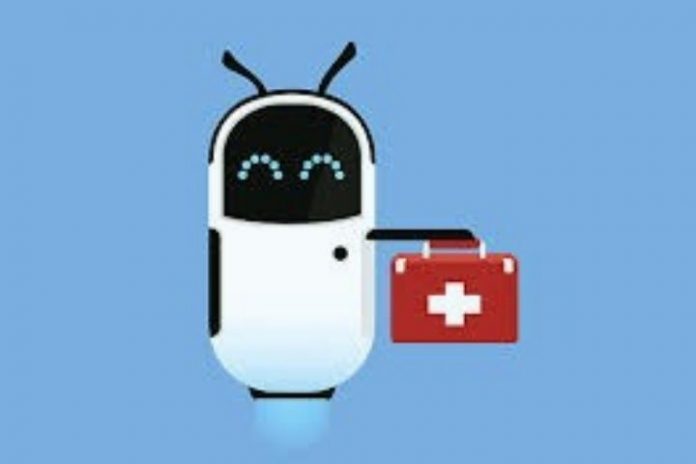GPs and nurses in the Merton and Wandsworth Constituency in London are testing the use of artificial intelligence (AI)-based apps to detect cancer at an early stage. The application analyzes the combination of signs, symptoms, and risk factors during patient consultations and thus helps to identify patients with an increased risk of cancer. And since 2016, the Moorfields Eye Hospital NHS Foundation Trust has also been cooperating with a company specializing in artificial programming intelligence to help doctors diagnose and treat serious eye diseases.
According to a CB Insights report on Healthcare AI Trends to Watch, use cases for AI technologies in healthcare have increased significantly, especially during the COVID-19 pandemic. It’s not yet clear to what extent cheaper, faster and better MRI and CT scans or telepathology can transform the way pathology labs work – but it’s already clear that AI will play a significant role, the study finds.
For this reason, it is not surprising that private equity investments in AI in healthcare are steadily increasing. In addition, organizations are increasingly concentrating on trends such as personalized medicine – the role of technology will therefore continue to be increasingly important in shaping the future of healthcare.
Artificial intelligence can be used in healthcare in the following areas:
- Better Diagnosis, Less Misdiagnosis
Misdiagnosis can lead to potentially deadly circumstances, so the promise of AI to improve the diagnostic process is inspiring and game-changing. For example, the UK’s National Health Service (NHS) uses AI technology to analyze the CT scans of their patients suspected of having coronary artery disease. An individual, personalized 3D model is then created from the scans with the help of AI. In turn, this helps the doctors examine the blood flow in detail and gain meaningful insights. In radiology, on the other hand, computer vision helps, for example, to detect anomalies in medical scans and to make a better diagnosis.
- More Efficient Decision
-Making AI provides much-needed, actionable insights based on automated data analysis, empowering healthcare workers to make more informed decisions. The problem with this is that information must be accessible on the one hand, but on the other hand, it must also be protected to prevent misuse. Therefore, there must be sufficient measures and checks. Framework and governance models must enable agility and speed while protecting personal data.
- Early Detection Of Diseases
When it comes to severe diseases like cancer, the delay means the difference between life and death. AI-supported solutions help in the early detection of the disease and accelerate the start of treatment by suggesting suitable and individual treatment paths.
- Faster, More Reliable Diagnosis
An MIT research team developed a machine-learning algorithm to analyze 3D scans up to 1,000 times faster than before. Such applications can prove extremely valuable as image analysis is still a tedious and time-consuming process for physicians. Addenbrooke Hospital in Cambridge, for example, uses a unique system to process scans of patients with prostate cancer automatically. AI image analysis also enables remote treatment by sending information to doctors using tools such as cameras.
- Simplifying administration
Currently, processes in healthcare are often repetitive, tedious, and very time-consuming. Technologies such as automatic speech-to-text transcription are helping to simplify, speed up or even eliminate these tasks for doctors, nurses, and support staff. Nevertheless, the focus should not only be on blindly automating existing processes but primarily on eliminating unnecessary or redundant processes using real-time processes.
- Maximizing AI Adoption in Healthcare
While AI holds tremendous potential for healthcare and medicine, it also brings specific challenges – particularly those related to privacy and ethics, as noted earlier. Given the highly personal nature of healthcare, earning patients’ trust when it comes to relying on machines and artificial intelligence for diagnosis and treatment is crucial.
From a technology perspective, there are a few ways that healthcare providers can prepare to make the most of AI in their operations.
- Build A Data Lake: Consolidating data into a data lake gives organizations the flexibility to use the data for various use cases. Even if these are not to be used immediately, it can be helpful to have the necessary analysis functions in the first place.
- Creation Of Privacy Protocols: As automation increases, detailed privacy protocols that have been put in place and internalized are critical.
- Training: All stakeholders in the healthcare system must be trained to use the information and tools properly. Otherwise, undertraining can lead to unintended consequences that can cause serious harm.
On the regulatory side, government agencies are already forming forums and committees to set up control and governance mechanisms to prevent misuse of the data collected. However, it is at least as important to view the adoption of AI in healthcare from a strategic perspective and focus on maximizing its positive impact while minimizing the risks.
AI and machine learning are proving fundamental to the early diagnosis of acute diseases and have radically improved the accuracy of diagnoses. The transformative impact of delivering services faster through AI-powered tools has a positive effect on patients. Given the combination of innovations in AI, increasing shortages of trained healthcare professionals, and a rapidly aging world population, AI in healthcare is and will remain a perennial favorite.
Also Read: Artificial Intelligence Has Arrived In The Business Mainstream


